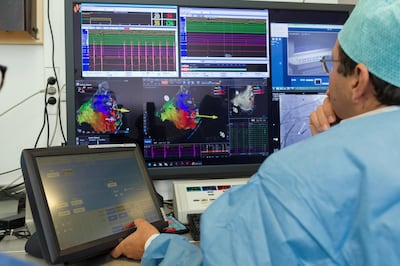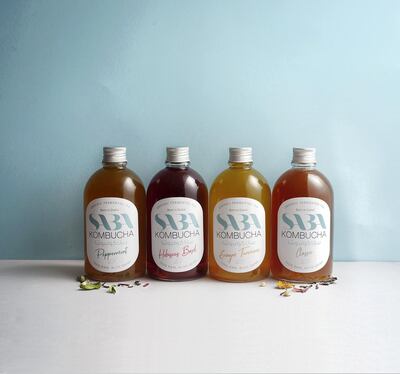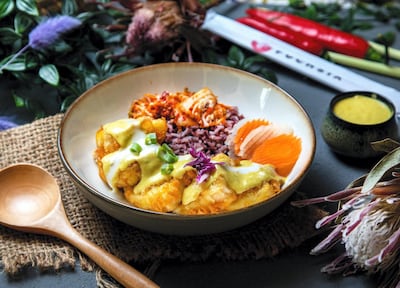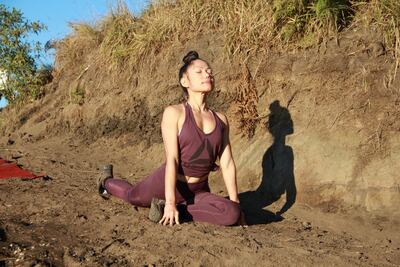As the year kicks off, well-being is at the forefront of everyone's minds. The pandemic has proved that optimum mental and physical health isn't a choice, but a goal we must work towards and maintain. So it's no wonder that despite gyms being closed for a portion of the year, many in the UAE have shown a renewed focus on their health. A Fitbit survey of more than 1,000 people in the Emirates in August found that 66 per cent felt they'd developed healthier habits during the pandemic, including sleeping longer, eating better and being more active.
Here’s a look at some of the other wellness trends we can expect to see more of as the year progresses.
Boosting immunity
Covid-19 shone a spotlight on the importance of a strong immune system, with many seeking out everything from ginger, honey and turmeric to immunity-boosting shots, a trend that is likely to spill over well into this year.
Eda Gungor, founder of Seva Experience, says there has been something of a value shift, with ingredients classically reserved for restaurants now taking pride of place in people's homes. "Immune-boosting and supporting supplements stand out, and we witnessed the likes of medicinal mushroom extracts and anti-inflammatory natural ingredients becoming common household ingredients," she says. "Fermented and cultured foods such as kombucha and kimchi, which support gut and microbiome health, a cornerstone for immunity, also became mainstream."
Even with vaccines available, Harkirat Singh Wilkhoo, a health and lifestyle coach at RAK Hospital, predicts the year will continue with people following protocols to reduce the chances of infection, which will include good nutrition and home cooking in addition to immunity strengthening. While many products promise quick benefits, Wilkhoo recommends going old-school, such as eating more citrus fruits for vitamin C, green leafy vegetables for minerals, dairy products for calcium, natural sunlight for vitamin D, and doing regular physical and breathing exercises to reduce stress.
Veganism and seafood substitutes
Choosing to eschew meat and animal by-products isn't a new trend, but it certainly is one that seems to be going from strength to strength, as people take up a vegan diet for both ethical and health reasons. Deliveroo experienced a huge increase in demand last year, with orders for plant-based dishes up 115 per cent.
"To understand the far-reaching impact of consumer demand for vegan food, just take a look at the global landscape, where major food and beverage chains that traditionally built their brands on meat-based menus, now offer plant-based options," says Roy Koyess, founder of snack brand Freakin' Healthy. The next step may be to separate the health-boosting ingredients from the unhealthy plant-based options out there, he says.

Last year was also when faux meats and plant-derived proteins found their way to many a menu and plate.
From Ikea introducing its famed meatballs as "plant balls" made using yellow pea protein, oats, apples, onions and potatoes, to McDonald's working on a McPlant line, there was plenty to suggest that the big two, Beyond Meat and Impossible Foods, are not going anywhere. The UAE also welcomed new entrants, such as Future Farms. With the market increasingly saturated with faux meat that promises to taste like beef or chicken, the next food group to make a splash may cater to seafood lovers, believes Kismerlly Alvarez, chef at Root'd, a plant-based meal subscription company that launched in the UAE last year.
"I believe 2021 will be the year for fish substitutes," she says. "Some products are already on the shelves, and we will see more of that in the months to come." Currently available in the region are Quorn's breaded fish-less fillets and no fish fingers, at www.organicandreal.com.
Integrated apps
Movement trackers, sleep detectors and hearing health monitors have become par for the course, with many people relying on wearable fitness gadgets for everything from reminding them to walk to GPS location-tracking – and this year, more platforms and products that integrate technology and wellness are likely to be introduced.
"As we are learning more about the mind-body connection, the top trends for health and mental health will also support that integration," says Christine Kritzas, a psychologist at The LightHouse Arabia.
Last month, Apple launched Fitness+, a subscription service that combines pre-recorded guided workouts with personal metrics from the Apple Watch, with details such as heart rate and calories burnt displayed live on the screen.
Kritzas says this is only the beginning. "There will be more integrated health apps that help people keep track of everything, from meditation, yoga and exercise to sleep and journaling, all in one place." But she says she is yet to find one that does this well. This may well be the year that changes.
Socially-distant outdoor activities
Over the course of last year, several outdoor activities – from roller skating to cycling – experienced a boom, and it looks like this is going to continue. With gyms being enclosed spaces with shared equipment, it's easy to see the appeal of open-air activities that limit physical contact. Yoga instructor Nerry Toledo from Dubai believes that socially distanced outdoor activities, including yoga, will be big this year.
“The capacity limitations at studios will push instructors and owners to extend to special events and outdoor yoga classes with social-distancing spacing,” she says, citing classes on beaches, in green spaces and other unexpected places in the city as possibilities.
Meanwhile online and virtual classes, which experienced a boom in 2020, are here to stay, too – but they will have reduced demand, Toledo says. "While digital options have helped us through the pandemic, they cannot completely fill the void of connecting. Humans are social animals, and we thrive on interacting with others."
Tele-medicine and home health care

One silver lining of the pandemic is that it proved numerous services translate just as well online, including visits to the doctor. Telehealth or telemedicine – terms used to describe healthcare provided virtually – shot into the spotlight last year and show no sign of abating. And in June, Medcare partnered with Deliveroo to offer patients home delivery of their medication via a new tab in the app.
Dr Raza Siddiqui, executive director, RAK Hospital, refers to this as the "Uberisation" of healthcare. "Telemedicine has been around for the past 20 years. However, during the pandemic, hospitals across the world turned to it to keep in touch with their patients remotely and to continue catering to their outpatients."
Dr Ziad Alobeidi, head of telemedicine at Medcare Hospitals & Medical Centres, agrees that it promises to go strong. “As the Covid-19 virus stressed the healthcare system, telemedicine stepped up to help healthcare providers better respond to the needs of patients.
“Telemedicine is perceived by patients as a convenient, accessible and safe alternative to access healthcare services and stay in touch with their provider. There is a push from the public to continue this type of service, so I expect it to become a standard of care for many.”
Home healthcare is also experiencing a boom. Dr Shekhar Mehta, founder and medical director of home healthcare provider Healthserve, says this is partly because of the pandemic, but also cites other reasons for its increasing popularity, such as the rising incidence of chronic diseases. The service is also a boon for elderly patients.

Mental health and self-care
Mental health is hardly a new taking point; however, experts believe the pandemic is another reason it deserves to stay in focus. "Covid-19 has resulted in significant changes in all aspects of people's lives, including jobs, schooling, health and social relationships. It has contributed to a mix of mental health issues such as anxiety, depression, panic disorder, obsessive-compulsive disorder and agoraphobia," says Dr Rasha Bassim, medical director and specialist psychiatrist at Priory Wellbeing Centre in Dubai. She says these emotions will continue, due to an uncertainty over the future.
While the long-term consequences of the pandemic on our mental health are still being studied, experts are calling for renewed attention and high-tech solutions. "As healthcare systems around the world are overburdened, it becomes imperative for the community to collaborate and find ways to prioritise well-being," says Aakanksha Tangri, founder of health and wellness platform Re:Set, which has its headquarters in Dubai. "In the new year, I think there will be a focus on communal self-care. That is, more wellness programmes, corporate challenges and other such activities, whether they are virtual or in-person."
In Abu Dhabi, House of Nature Medical Centre, founded by Saba Khan, has introduced programmes to promote relaxation and reduce stress. Yoga and meditation aside, aqua therapy, salt room therapy and medical massages are rising in popularity. Khan says: "Not only are we observing better mental health awareness among patients signing up for these programmes, but we also have a higher number of patient referrals from contemporary medical practitioners than ever before."





